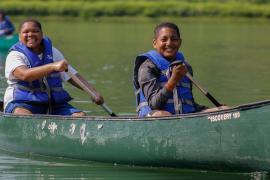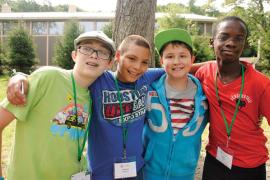The dining hall area is filled with families playing Loteria (like Bingo except pictures are called out instead of numbers). Loteria is the Spanish word for lottery. The excitement builds with the anticipation of one of the 54 different images appearing on one’s own tabla, a board with a randomly created 4 x 4 grid of pictures with their corresponding name and picture. Players choose what tabla they want to play with and settle in for several rounds of conversation and adrenalin.
Circling the Staff
This story is very much about success and about embracing the gifts people bring to our camp community. As a team, we decided that we were going to live our mission by serving more kids in our community in a way that stretches us as team members and stretches our reach into underserved communities.
I relied heavily on my first experience in the early 2000s of hosting a weekend event for native Spanish-speaking middle schoolers. I remember being overwhelmed with the event check-in lines because the entire immediate (and sometimes extended) family was waiting in the line with their camper. I vividly recall getting through the check-in process and starting to corral the participants in the activity groups, only to be interrupted by several frantic calls over the walkie-talkie. The staff member, whose South Georgia accent added more confusion to the message, said, “But ma’am, they are just sitting in their cars . . . some of them aren’t even in the shade. They will roast by lunchtime.”
The young high school volunteer on the walkie-talkie was full of politeness and was just as perplexed as I was that there really hadn’t been a “drop off” but more of a “drop near.” My pie-eyed native West Virginian roots clashed with the cultural norms of the population we were serving that day in the hot asphalt parking lot. No number of “ma’ams” and “sirs” could bridge the divide. We were being perceived as rude as we tried to encourage the participants’ family members to leave, control the event staff’s noticeable puzzlement that the crowd still remained, and continue our efforts to proceed with camp by getting the campers into groups.
Because of this past experience, I knew we would host an entire Latino/a Family Camp. I knew that we would include the entire family and no one would be sitting in a hot car waiting for the camp day to end. Our campers for the weekend would be brand new babies and their adoring abuelas (grandmothers). We were going to find resources and educate ourselves on the steps to success.
How Did We Get There?
We are products of our own environments. We do what our parents do — whether we watch ABC News or CBS News; employ the use of a gas grill or charcoal during a cookout; decorate the holiday table with cornbread stuffing or white bread dressing; or come October, cheer for the Yankees or the Red Sox. The entire idea of camp was as unfamiliar to the Latino/a community as an HGTV show about home improvements not ending with a surprise during the remodel, and about as easy to define as it is to find a flea in a washing machine.
My staff and I had to put ourselves in a much different space. It was more than a two-minute phone call about the phrase “turtle time” (our camp lingo for rest hour). We had to channel the angst of deciphering an entire can of government agency acronym soup. We had to creatively engage in outreach for our programs into the communities where we had traction and connections with community builders.
We carefully thought through our use of words — Latino Family Camp vs. Latino/a Family Camp vs. Hispanic Camp. We wanted to be as inviting and as politically correct as possible.
We debated about the flood gate that could open if we published information about the event in Spanish. Did this send the message that if you called with questions a Spanish-speaking person would be at the other end of the phone?
How inviting was square dancing? We landed instead on a Zumba class that had enough cardio in it to be used as an Olympic readiness workout.
What were the critical areas of the weekend’s program that needed a skilled language speaker immediately available? Our ropes course activities and waterfront activities were facilitated by our program staff, and a native speaker would need a tutorial ahead of time. It turns out that belay in Spanish is belay.
Would a menu of traditional dishes be received as a welcoming effort or mocking of culture? Our somewhat stressed food services director was involved in working with the weekend’s community builders, engaging them in flavorful conversations about the food selections. A very helpful hint that was shared with her was having Tapatio hot sauce on every table for every meal.
When it came to housing of the families in our existing cabin structure, how would we respectfully assign cabins? This was another time when we leaned on the community builders supporting the weekend. They shared with us the desire for families from the same regions or countries to be housed together. This was another example of being a product of our environment — everyone wants to be with others from similar backgrounds with whom they share similarities.
We had to find a comfortable blend of cultural norms for our families who were hurt by our refusal of their help in the kitchen throughout the day. Our compromise was to create a facility service project that has been part of this camp program for the past three years — removing carpeting and laying tile in the health center, painting the main bathroom and entryway in the lodge, and framing out a wood chip path to the main campfire circle.
How could we let the younger campers be campers and not spend the weekend as language go-betweens for the adults in their family? We looked for volunteers in our camp community who speak Spanish and traded a reduction of weekend fees for their expertise.
Our team spent time in small groups going through every aspect of the schedule for the weekend. We had to find a flow and pace that worked for our first-time campers. Turns out, whether it’s called siesta or turtle time, it is always a bigger hit with the adults than with those under ten years old.
Where Are We Now?
We have grown, reflected, and improved as we head into our fourth fall offering this specific program to the community. We dream as a team that we could have a spot on our calendar marked All Families Camp. In a perfect world, there would be a rich celebration and diversity of attendees, and everyone would feel comfortable completing the registration form and driving out from the city. We aren’t there yet.
I was struck by an e-mail I received from a parent on a Sunday afternoon just as the Latino/a Family Camp program had wrapped up. She wrote the majority of the e-mail in Spanish with the exception of this phrase: “The weekend was a newness like nothing else experienced.” I have that phrase taped on the threshold of the door that leads into the staff workroom. We treasure these opportunities when we are able to share a newness like nothing else experienced.
Kat Shreve is the director of YMCA Camp Colman in Longbranch, Washington, and a member of Camping Magazine’s Editorial Advisory Committee.



